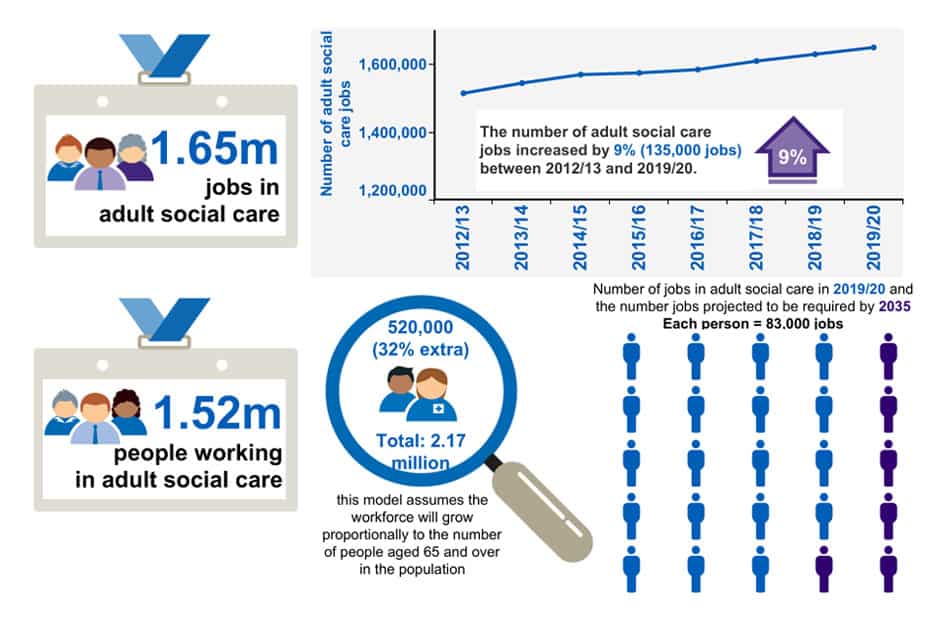
Figures show home care workers than care home workers
In Skills for Care‘s latest report into the size and structure of the adult social care workforce, the number of jobs in domiciliary care surpassed those in residential care for the first time.
The latest analysis, which covers March 2019 to February 2020, includes the number of care organisations in England, an overview of the makeup of the workforce and a look into changes in trends from previous years.
The impact of coronavirus on the adult social care sector has been huge of course, and it should be noted that these figures predate this crisis.
A year in reflection
In 2019, Skills for Care reported there were 1.49 million people working within the adult social care sector in England, with 1.62 million jobs. In the latest report, it is now estimated there is 1.52 million people working in adult social care and an increase to 1.65 million jobs.
Although the number of jobs has increased, the number of employers has decreased with an estimated 18,200 organisations and 38,000 locations providing or organising adult social care, compared to last year’s figures of 18,500 organisations and 39,000 locations.
Since 2012/2013 the direct payment option has also seen steady growth, increasing by 11%, equivalent to around 130,000 jobs. As more service users choose to shift away from services offered by their local authority, this has led to a decrease of 25% (around 37,000 jobs).
Using the data gathered from this report, Skills for Care states that on average, for every seven people aged 65 and over in the population, one adult social care job is required.
Domiciliary care leading the way
A surprising result within this report is the number of jobs within domiciliary care services. It is well known the home care industry has been continuously growing over the last decade, and it is within the last 12 months that the catch-up to the residential sector has truly begun.
The Skills for Care report confirms, for the first time since the reports began, the number of domiciliary care jobs is now higher than residential services. The steady increase has been tracked between the 2012/2013 to 2019/2020 reports, with this year’s release showing the home care sector has seen 95,000 jobs become available in that time, compared to residential which has opened only 25,000.
The estimated number of domiciliary adult social care jobs within England is now 715,000, making up around 43% of the overall main services within the care sector. This number was further broken down into care types, including:
- 520,000 jobs in locations offering CQC-regulated domiciliary care services
- 120,000 in locations offering supported living services
- 29,000 in locations offering extra care housing
The number of people working full-time across the sector has also seen a change. In 2018/2019 there were 1.13 million people covering a full-time position; this has further increased in 2019/2020 to 1.16 million, an increase of 30,000 people now working over 35 hours per week.
In our state of the adult social care workforce 2019 blog, we also covered the statistics of workers aged 55 and over that were making up 25% of the UK’s workforce, according to the national data set. In April 2020, the Office for National Statistics confirmed this number had already risen to a record high of 10.7 million people working in the UK that were over the age of 50. A further surprise came when the number of over 65s remaining in work was announced, with another record high of 1.39 million.
The Future
To conclude the report, Skills for Care provide projected expectations for England’s care sector based on the statistics of this 2019/2020 data. The projections do not take into consideration the impact of COVID-19, although it is expected this data will affect the 2020/2021 report.
Based on its findings, Skills for Care estimates that the number of jobs within the adult social care sector needed to meet the demands in 2035 will have increased by 32%, the equivalent of 520,000 new jobs.
Alongside this, the report expects these figures to change considerably. Technological advancements surrounding health are advancing at an accelerated rate, with the COVID-19 pandemic forcing people to adapt to digital at a rapid rate, moving the sector forward. As Unique IQ’s Managing Director, David Lynes, stated: “If there is one lesson to be taken from this year’s events, it’s that we can change and we can do it quickly. We are working in ways that we previously thought impossible.”
Through new hardware such as wearable devices for service users, to software used by care providers to oversee trends or share client information in real-time, technology is set to be a major stepping stone towards supporting the increasing numbers of people needing care, as well as those who provide it.
Unique IQ creates innovative software solutions to help home care agencies deliver better care. Find out more.